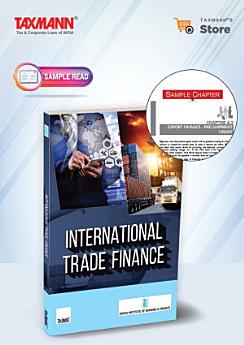IIBF X Taxmann's International Trade Finance – Complete | Expert-vetted Guide on—Trade Theories | ICC Rules | Regulatory Frameworks | Risk Management | Digitisation | LIBOR-ARR Transitions
About this ebook
This book is intended for the following audience:
• Bankers & Finance Professionals – Needing to stay updated with the latest regulations, financing options, and documentary practices in international trade
• Exporters & Importers – Looking for practical guidance on foreign trade policies, documentation, customs, and risk mitigation strategies
• Students & Academics – Pursuing specialised courses/certifications in international business, banking, or finance
• Corporate Executives & Legal Advisors – Seeking clarity on the regulatory landscape, trade documentation, and compliance requirements across different jurisdictions
The Present Publication is the 2025 Edition, updated by Gaurang Vasavada (Trainer and Consultant-Forex | Trade and International Banking & Ex-Banker – ICICI Bank). It is vetted by Sugata Datta (Former Chief General Manager – Bank of India | Ex-Faculty – Indian Institute of Banking & Finance (IIBF). Taxmann exclusively publishes this book for the Indian Institute of Banking and Finance with the following noteworthy features:
• [Holistic Coverage] Ranging from classical theories of international trade to the latest ICC guidelines (UCP 600, URC, URDG, ISP 98), ensuring a well-rounded understanding of trade finance
• [Regulatory & Policy Insights] Incorporates the latest stipulations of RBI, DGFT, Customs, and international bodies, including foreign trade policy updates
• [Contemporary Themes] Dedicated coverage of digitisation (e.g., eUCP, blockchain in trade), supply chain financing, trade-based money laundering, and sanction compliance
• [Practical Case Studies] Illustrates how to read documentation, mitigate risks, and handle common pitfalls (like fraudulent shipping documents)
• [Focused on Skill & Knowledge Enhancement] Concludes each section with multiple-choice questions (MCQs) that assist with self-assessment, crucial for IIBF exam candidates and practitioners refreshing their knowledge
The coverage of the book includes:
• Section 1 | Introduction to International Trade Finance
o Explores classical and modern theories of trade, roles of WTO and trade blocs, exchange control regulations, and embargoes
• Section 2 | Trade Transactions
o Discusses the various components of trade, documentation flows, payment modes, logistics, shipping formalities, and the advent of digitised processes (e.g., SWIFT)
• Section 3 | ICC Publications & their Role
o An in-depth explanation of key ICC rules (UCP 600, URC, URDG, etc.), along with practical guidance on Incoterms 2020, ensuring clarity on the responsibilities and liabilities in international transactions
• Section 4 | Financing Trade Transactions
o Focuses on pre/post-shipment finance, letters of credit, guarantees, factoring, forfeiting, and the transition from LIBOR to ARRs, highlighting the operational and regulatory aspects
• Section 5 | Regulatory Framework in India
o Provides exhaustive details on RBI guidelines, Foreign Trade Policy 2023, customs regulations, role of DGFT, FEDAI rules, and the support mechanisms offered by agencies such as ECGC and Exim Bank
• Section 6 | Risk in International Trade
o Addresses country/political risk, credit and currency risks, maritime frauds, legal risks, and trade-based money laundering (TBML). Advises on best practices in risk management and compliance strategies
The structure of the book is as follows:
• Logical Progression – Commences with broad principles (global trade theories), transitions into specifics (documents, ICC rules), and culminates in advanced topics (risk mitigation and digitisation)
• Chapter-end MCQs & Summaries – Facilitates quick revision and helps learners verify their grasp on complex topics
• Practical Examples – Illustrative case studies reinforce the practical application of theoretical knowledge
• Annexures & Appendices – Handy references, including policy details, guidelines, and contact information for export promotion councils
Ratings and reviews
- Flag inappropriate
About the author
Established in 1928 as a Company under Section 26 of the Indian Companies Act, 1913, the Indian Institute of Banking and Finance (IIBF), formerly known as the Indian Institute of Bankers (IIB), is a professional body of Banks, Financial Institutions and their employees in India. With a total membership of over 10 Lakhs, IIBF is the largest institution of its kind in the world. It aims to develop professionally qualified and competent bankers and finance professionals primarily through education, training, examination, consultancy/ counselling and continuing professional development programs.'
During its 95 years of service, IIBF has emerged as a premier institute in banking and finance education for those employed and seeking employment in the sector, aiming for professional excellence. Since its inception, the Institute has educated numerous members and awarded several banking and finance qualifications. JAIIB, CAIIB, Diploma and Certificate cover diverse and contemporary subjects in the banking & finance domains and have helped banking & finance professionals to sustain their professionalism through continuing professional development programs.







